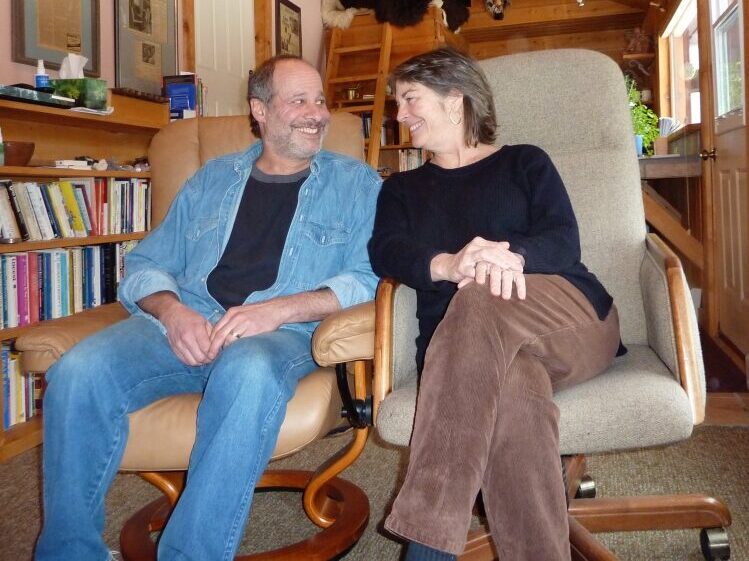When Israel and Cathie Helfand moved to Cabot in 1997, it was a conscious choice to bring hands-on homesteading into their daily life, and wilderness into their therapy practice. Using the carpentry skills that put Israel through graduate school, they rehabbed a 1845 farmhouse, built trails and gardens, and reintroduced farm animals, creating a space where visitors could decompress.
Many of their visitors are clients. For couples in trouble, the Helfands offer Marriage Quest, which is widely recognized as one of the top marriage retreats in the world. The Helfands have a high success rate when it comes to marriage repair, and they help to minimize harm for couples who choose to divorce. Couples from all over fly to Vermont and drive to the end of Deeper Ruts Road for a personal, three day intensive session with the Helfands. “They’re coming to a farm, as opposed to an office building,” explained Cathie. “A lot of the couples we work with have a farming connection, so it’s coming home, to a certain extent. It’s what you think of when you think of a family farm.”

Marriage Quest was closed for the duration of Vermont’s pandemic shutdown, but meanwhile, COVID-related stress pushed more couples to the point of fracture. And without high speed internet, the Helfands could not offer virtual therapy to people seeking their services. “It would have been another option,” mulled Israel. “Even a short conversation with a couple in crisis is helpful to them.” Since the Helfands reopened the retreat, their waiting list has only grown. Clients are now welcome at the farm as long as they’re vaccinated. “In the last month, we’ve had California, Ohio, and Pennsylvania,” observed Cathie.
The Helfands believe that the unique success of their retreats lies in a few factors that differentiate their approach from traditional models. These include therapy at “warp speed,” as Israel put it, focusing on personal growth within the context of the relationship, all taking place in the restorative environment of the farm.
When they moved the practice to Cabot in 1997, most communications infrastructure was still offline. Whether you worked in an office building or on a farm, you made appointments over the phone, sent paperwork through the mail, and showed up for conferences in person. Almost 25 years later, nearly all of that infrastructure has moved online. Recently, and especially during their retreat’s forced closure during 2020, the Helfands have come to believe that high speed internet is a major missing piece in their business operations.
It even affects how they maintain their licenses to practice. “I have to have so many continuing education units, because I’m a state licensed marriage and family therapist,” explained Israel. But without high speed internet, he lacks the bandwidth to attend a virtual meeting. So when the American Association for Marriage and Family Therapists sent an email to their members announcing a virtual conference for the second year in a row, he contacted them for a workaround. “They actually called and said, we’re so sorry, we don’t have a mechanism for weeding out those who can’t attend, because the majority of our membership lives in areas where there is fast internet access,” he said.
Now, picturing a future where they could soon offer therapeutic services virtually, the Helfands say yes and no. They’ve had plenty of time to think about how they would like to use high speed internet when they have access to it. Since the shutdown, they’ve honed in on the idea of using broadband for an initial meeting with couples interested in their services. “I think the virtual would be really good for the vetting process,” said Israel. “As I get older I find I have a little less patience and want to work with couples who are a really good fit. So I’d like to spend a little time talking to them, and broadband would help me do that.” As broadband access appears to get closer, the Helfands are also thinking about tutorials and trainings they could develop and share, and how a virtual option would help them follow up with couples after a retreat.
But they both agree that for them, the customized therapeutic experience they offer couples needs to be in person. And that’s not necessarily an option for every couple who needs their services.
For those couples, the Helfands have a referral: their son, psychologist David Helfand, who lives in Cabot but maintains an office in St. Johnsbury with high speed internet. When the pandemic shut down Marriage Quest, Israel and Cathie asked him if he would consider offering couples’ retreats for those they weren’t able to serve. “He’s really good at it,” said Cathie. “I’ve sent everyone to him because he’s virtual and has fast internet.”
For more information: marriagequest.org
